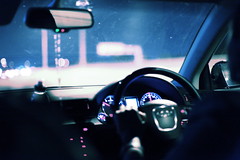| Drive (Photo credit: kaysha) |
Most drivers are not thinking of fuel consumption when they drive. In past years, it might not have been as much of a consideration, but with the gas prices getting to be so high, we must all think about how we can reduce our gas usage. After all, it is getting harder and harder to be able to afford frequent fill-ups at the gas station! What follows are a few pretty basic ways that you can change your driving style to a more fuel-efficient one.
1. One big mistake that many drivers make is accelerating too often. If you pay attention, you will notice that the vast majority of drivers accelerate almost all the time. It does not matter whether they are 50 feet from a red light or a turn that they will have to slow down for, they will continue to have their foot on the gas right up until they have to brake. This is a mistake for a number of reasons, all of which can affect fuel consumption.
First of all, it makes no sense to speed up towards a red light that you will have to stop for in a short distance. Instead, why not take your foot off the gas and coast a bit? This will not only allow you to save your brakes, but if the light changes, you can continue coasting until it is time to accelerate, and you may be able to do so without ever having to completely stop. Your car will use a lot less gas starting from a coasting speed of 20 miles per hour than it would from a complete stop. Again, the light is red anyway, there is simply no need to accelerate towards it.
2. If you have a turn coming up shortly, there is also no need to accelerate right up until the point where you must turn. Why do so, when you will then have to brake aggressively in order to safely make your turn? Instead, when you reach a reasonable distance to your turn, take your foot off the gas pedal and coast a bit before slowly easing on the brake and making your turn. Doing so will not cost you much time, and it will save gas as well as your brakes, both of which cost a fair amount of money.
| Driving Cars in a Traffic Jam (Photo credit: epSos.de) |
Think of it as trying to keep your engine RPMs as constant as possible. Try watching your tachometer (the gauge that measures your engine's RPM), and learn to drive while minimizing the spikes and keeping the engine's speed as even as possible - usually mine is the most efficient when I'm around 2,000 - when I'm in that range, I know I'm getting close to 40mpg, and it's taken me a while to learn how to get up to 40-45 mph without the needle going over 2,000, but it definitely works!
These subtle tweaks to your driving style won’t cost you any time or money, and will save you a lot of gas and wear and tear on your car. Also, if you drive less aggressively, you will accumulate less traffic tickets and accidents, which can cost you way more money than gas ever did! It's a positive change all around. Also as a mental benefit, I've noticed that when I drive less aggressively, I also feel less aggressive, which reduces my stress and even helps me enjoy driving more. Try practicing all of these tips over the next several weeks, and you may be surprised to see how much your mileage improves!



No comments:
Post a Comment